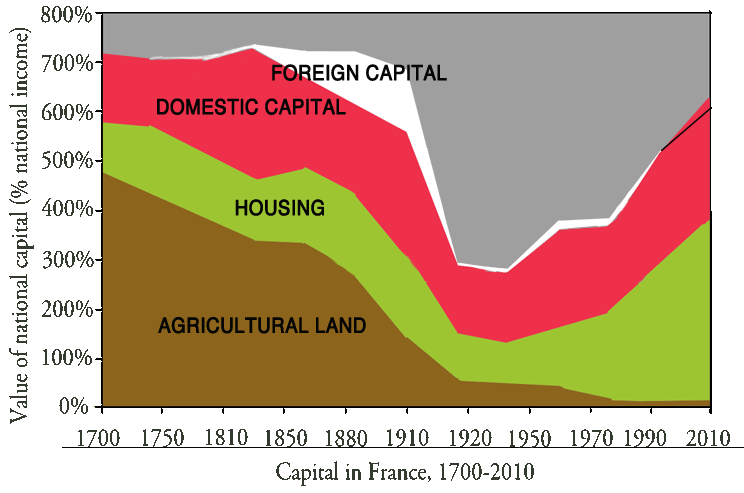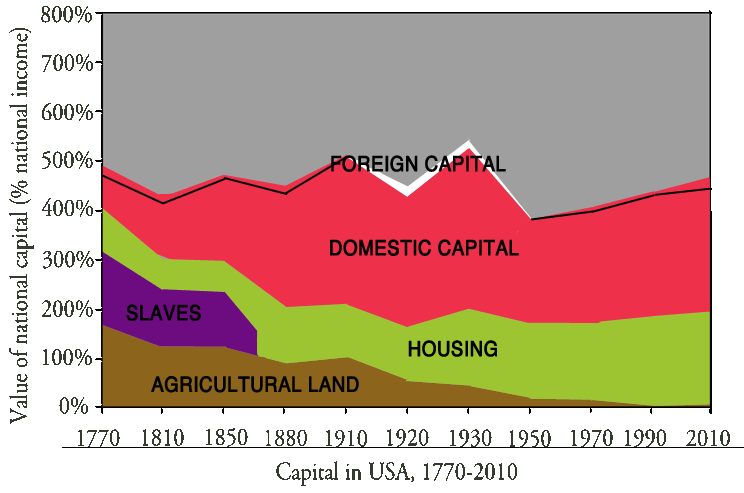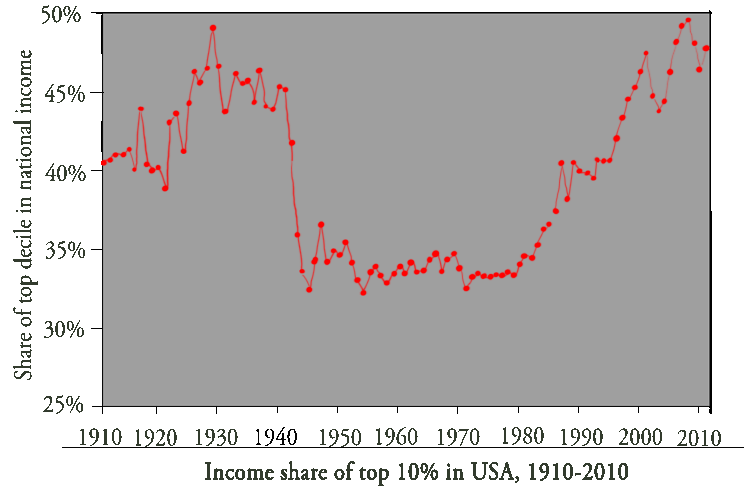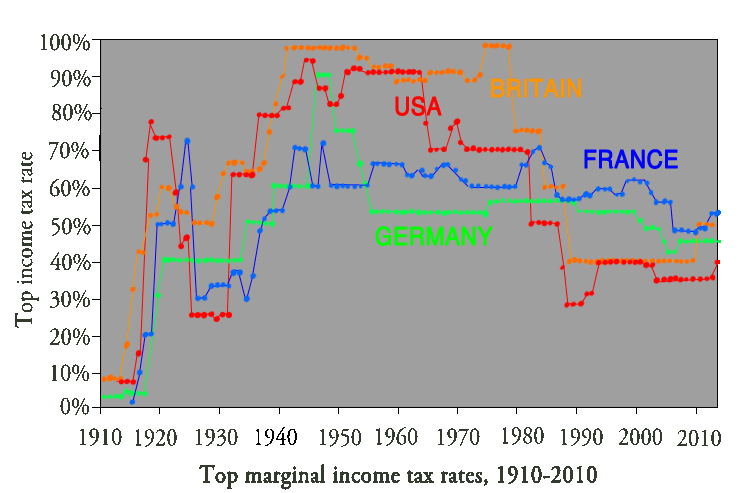
I've written before about the huge change that transformed the US in 1980, and which many people still don't appreciate: the change from liberalism to plutocracy. For nearly fifty years, the country was run for the benefit of the people as a whole: as productivity rose, all classes shared in the benefits. Since then, the country has been run for the benefit of the rich. Productivity is still rising, but the gains entirely go to the top 10%.
What Piketty does is put this change into context— into the story of the past 300 years. Though he doesn't discount political factors, it turns out that the change is not simply a matter of a few bad actors. It's largely a reversion to the historical norm.
If the book can be distilled into one chart, I think I'd pick this one.

(What I'm talking about here is the effect of colonialism on the colonialists. Orwell was (for once) simply wrong when he asserted that everyone in Britain made their living "off the coolees". The picture was different, and of course far less benign, for the colonies. In 1913 Europeans owned 1/3 to 1/2 of the domestic capital of Asia and Africa, and 3/4 of their industrial capital.)


So, the period of liberalism I described exists, and shows that it is possible to have a more equal distribution of income. But it has to be put in context: the natural tendency of capitalism is to transfer wealth more and more to the capital-owning class. The world wars, the Depression, and the threat of communism all helped to counter this tendency for half a century, but we're heading quickly back to Victorian-style capitalism— high incomes for the few, declining incomes for the many, and the increasing domination of inherited wealth.
(Piketty is full of important nuances, and one is that the situation isn't the same as in 1913. For one thing, the social safety net greatly improves the position of the middle class (those earning more than the median income but less than the 10%). For another, the contemporary rich earn much more from labor income than their 19th century counterparts, who mostly lived on their investments.)
Now, people knew the story about income before Piketty, but what he brings to the table is threefold:
By the way, 5% is not a ceiling. The richer you are, the better rates you can get, partly because you can pay for top-rate advisors, partly because higher-yield investments become available to you. (Most shlubs can only get by with the 0.1% rate on their savings. Just as a data point, Harvard, the university with the largest endowment at over $30 billion, is getting a rate of return north of 10%.
Now, we don't always have r > g. During the Trentes Glorieuses, European growth rates were over 4% while the rate of return on capital dipped below 3%. Modern US growth rates tend to be higher than European and Japanese because we have higher immigration, growing the population. For thirty years, China's growth rate has exceeded 11%.
These growth rates, nice as they are, come from catching up to advanced nations, or rebuilding after a war, or massive population growth. We are likely to get high growth rates in the developing world for awhile, but once they catch up, it's over.
1. Maybe nothing, which is the current plan. Then the 1% will increasingly own everything that can be owned. As the 1800s show, domination by plutocrats can last for a long, long time. Before you embrace this alternative, perhaps because you worship The Market, consider:
2. Hope that things will get better, especially if we don't elect parties that actually propose to give even more money to the rich.
There's something to be said for not letting the Financial Sith Lords dominate completely. There are people who seriously want to dismantle the social safety net, eliminate taxes on income from capital, reduce immigration (so we don't even get that boost to g), reduce working class wages even more, and hand over the savings to the 1%. In other words, they want a shittier world. So it's nice if they don't get everything they want.
But Piketty's inexorable logic, the threat of a world where r > g always, means the problem is much more serious than just defeating the wingnuts. Note that first chart— it's from France, a country that many Americans view as half-socialist already. The logic doesn't depend on capital being evil, or capitalists being evil: they could all be pleasant fellows, but so long as r > g they take over in the long run.
3. Does education help much? In a word, no. Education just allows people to keep up with the increasing demands society makes on them. It may have a slight egalitarian effect, but it's swamped by r > g.
4. We could hope inflation takes care of the problem. Inflation was historically near 0% throughout the 1800s; it varied wildly in the 1900s, and it's less than 2% today. Does this help somehow?
Again, no. Inflation doesn't reduce r, it just adds to it. Rents rise as prices rise. It destroys fortunes stored in mattresses, but that's nothing more than a stupidity tax— your actual rentiers invest their money, they don't just keep it as cash.
What inflation is really good at is reducing government debt. That's nothing to sneeze at— it's basically how Europe paid for the world wars. But it doesn't redistribute income… except perhaps upward; rising home prices may price the poor out of the market.
5. We could return to a highly progressive income tax. That's what gave us a liberal society in the US. (In Europe it was more complicated— tax rates were not quite as high, but the state sector was larger.)

Piketty thinks this is a good solution, but not the best solution. For one thing, if we don't attend to capital, we're not striking at the complete problem. Plus, capital gains are easy to hide in a global market. Already there's been a race to the bottom in Europe, where countries try to attract investment by lowering taxes on capital gains.
This may be a rare case where Piketty over-emphasizes the French case. The highest marginal tax rate in France has remained close to 60% for seventy years; obviously this hasn't prevented the rise of capital. However, US rates have fallen from 90% to 40%— a huge windfall for the rich that has largely driven the rise of the 1% here. Piketty later suggests that a rate of 80% is probably optimal.
(As a reminder, the top marginal rate is what the richest people pay on increments to their income, after deductions. US rich people today don't pay 40% on their entire income. In fact the effective federal tax rate on the rich is 22.3%.)
As Piketty notes, very high marginal rates do not raise a lot of revenue— because their purpose is to lower the salaries of the rich. That's why US CEOs were paid 50 times the salary of the average worker in the 1960s, rather than the 500 times we see today. I should also note that allowing excessive salaries in the first place allows apologists for the rich to frame taxation as “taking their money”. Why is it “their money”? A company generates billions in revenue, and it's the company's decision to hand a huge fraction of that money to its executives rather than to the workers. And as the salary gap between the US and Europe shows, excessive salaries are hardly pay for extra work or productivity. US executives take the money because they can, and because compensation committees are made up of their pals.)
6. His preferred idea is a global tax on capital. One advantage is simply knowledge: we would learn a lot more about capital, where it is and who has it. He notes that if you look at published reports, you'll find that most nations are losing money to foreigners: the net balance of the planet is negative. This is impossible, as money lost by one person is gained by someone else! The reason is that a fair amount of investment is hidden in tax shelters.
A capital tax need not be large; e.g. he suggests a tax of 1% on fortunes from 1 to 5 million euros, and 2% on larger fortunes.
Taxes on capital are not unprecedented. Indeed, property taxes are an everyday example. During the European crisis, Greece and Italy proposed taxes on capital; the problem is that a single nation which implemented it would simply chase its rich people to another country. A European-wide tax would be a good start, though.
As you see, this is one of those book reviews that ends up retelling the book's story. How is it as a book? Well, I found it formidable. Piketty has found just the right tone, calm and nuanced, which is the best way to hand readers dynamite. Mostly he lets the data speak for itself, letting it casually demolish various more optimistic theories. Note that I've only communicated the gist above; the details and the differences between countries are worth following. Plus there are unexpected digressions into Austen and Balzac.
Plus, there's all sorts of things to learn… for instance, did you know that well into the 20th century the US, far from being a libertarian no-man's land, was more egalitarian than Europe? We had the robber barons, but we didn't have the European aristocracy nor the rentier class, and when income taxes were established our rates were far higher than in Europe.
Also of note: Paul Krugman's review of the book.
—January 2016
